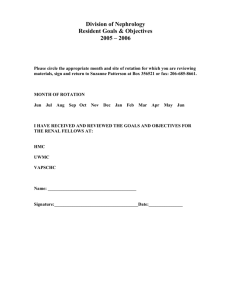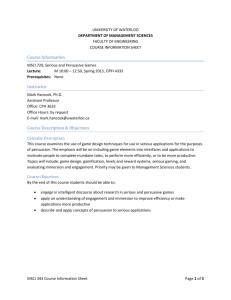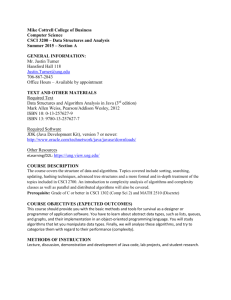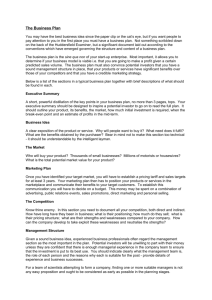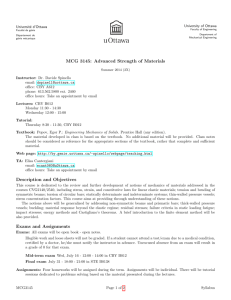CHEM 162-01 Muench (0211)
advertisement
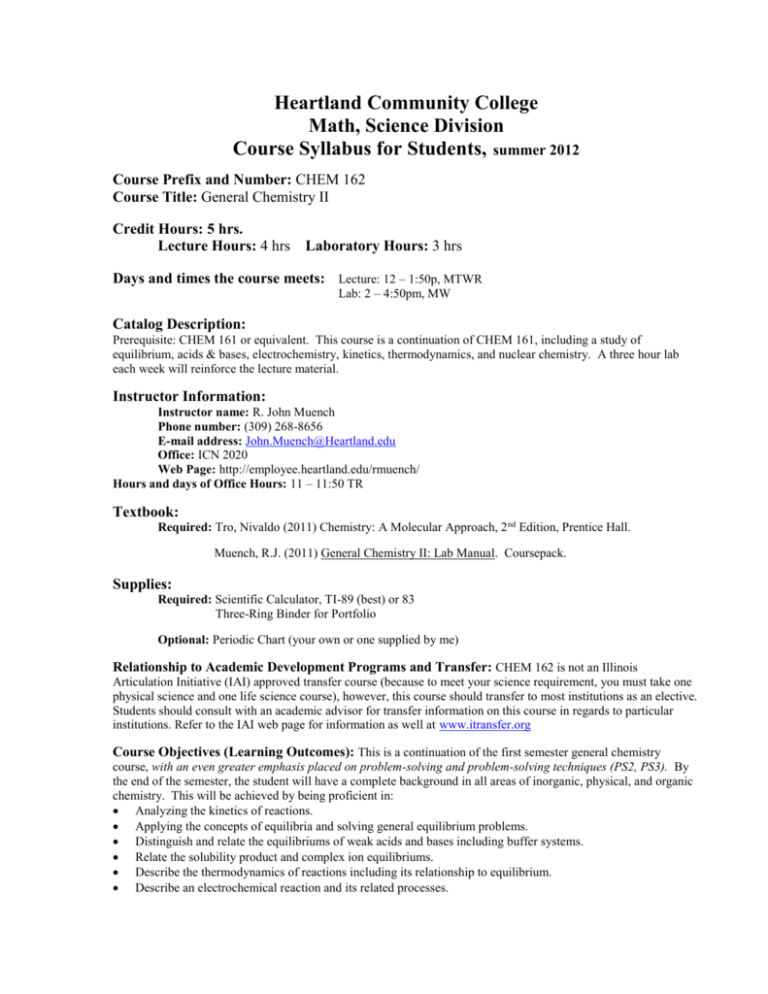
Heartland Community College Math, Science Division Course Syllabus for Students, summer 2012 Course Prefix and Number: CHEM 162 Course Title: General Chemistry II Credit Hours: 5 hrs. Lecture Hours: 4 hrs Laboratory Hours: 3 hrs Days and times the course meets: Lecture: 12 – 1:50p, MTWR Lab: 2 – 4:50pm, MW Catalog Description: Prerequisite: CHEM 161 or equivalent. This course is a continuation of CHEM 161, including a study of equilibrium, acids & bases, electrochemistry, kinetics, thermodynamics, and nuclear chemistry. A three hour lab each week will reinforce the lecture material. Instructor Information: Instructor name: R. John Muench Phone number: (309) 268-8656 E-mail address: John.Muench@Heartland.edu Office: ICN 2020 Web Page: http://employee.heartland.edu/rmuench/ Hours and days of Office Hours: 11 – 11:50 TR Textbook: Required: Tro, Nivaldo (2011) Chemistry: A Molecular Approach, 2 nd Edition, Prentice Hall. Muench, R.J. (2011) General Chemistry II: Lab Manual. Coursepack. Supplies: Required: Scientific Calculator, TI-89 (best) or 83 Three-Ring Binder for Portfolio Optional: Periodic Chart (your own or one supplied by me) Relationship to Academic Development Programs and Transfer: CHEM 162 is not an Illinois Articulation Initiative (IAI) approved transfer course (because to meet your science requirement, you must take one physical science and one life science course), however, this course should transfer to most institutions as an elective. Students should consult with an academic advisor for transfer information on this course in regards to particular institutions. Refer to the IAI web page for information as well at www.itransfer.org Course Objectives (Learning Outcomes): This is a continuation of the first semester general chemistry course, with an even greater emphasis placed on problem-solving and problem-solving techniques (PS2, PS3). By the end of the semester, the student will have a complete background in all areas of inorganic, physical, and organic chemistry. This will be achieved by being proficient in: Analyzing the kinetics of reactions. Applying the concepts of equilibria and solving general equilibrium problems. Distinguish and relate the equilibriums of weak acids and bases including buffer systems. Relate the solubility product and complex ion equilibriums. Describe the thermodynamics of reactions including its relationship to equilibrium. Describe an electrochemical reaction and its related processes. Demonstrate an understanding of nuclear reactions and explain the energies associated with them. Define various organic molecules and predict their reactions. Understand the role of the functional groups in biochemistry. Characterize the chemistry of the non-metals and metals. Describe the chemistry of transition metals complexes and relate that to Crystal Field Theory. A three-hour laboratory exercise each week will reinforce the lecture material and help to illustrate some of the concepts from above. Since problem solving is the single most important aspect of this course, it will be emphasized in all homework assignments, quizzes, and tests. Course Outline: 1. 2. 3. 4. 5. 6. 7. 8. 9. 10. 11. 12. Chemical Kinetics (Ch. 13) Chemical Equilibrium (Ch. 14) Acids and Bases (Ch. 15) Aqueous Ionic Equilibria (Ch. 16) Free Energy and Thermodynamics (Ch. 17) Electrochemistry (Ch. 18) Radioactivity and Nuclear Chemistry (Ch. 19) Organic Chemistry (Ch. 20) Biochemistry (Ch. 21) Chemistry & Environment Metals and Metallurgy (Ch. 23) Transition Metals and Coordination Compounds (Ch. 24) Methods of Instruction: My philosophy is to present the lecture material as straight forward as possible, with an emphasis on problem- solving techniques. Memorization of formulas, weights, chemical symbols, etc. is not required, as I will supply these for you on the tests. Also, I will present and use many mathematical operations during the semester that you are expected to know. If you should have a problem of a mathematical nature, then you are encouraged to visit the ASC. Further, I try to treat all students with the utmost respect during and out of class and expect the same in return. Lastly, I am always available before and after class and have office hours scheduled during a variety of times – DO NOT be afraid to stop in and ask a question even if I look “busy.” My first priority is always to those students who are putting forth effort in the classroom. Course Policies: Method of Evaluation (Tests/Exams, Grading System): Grades will be determined by a combination of worksheets, tests, lab work, and a portfolio as follows: Worksheets / Quizzes = 150pts. Exams, 4 @ 100 pts each* = 300pts. Labs = 200pts. Special Topic = 50pts. Portfolio = 100pts. Final Exam = 200pts. 1000pts. *lowest exam is dropped Grades are all based on a 90.00 – 80.00 – 70.00 – 65.00 scale. However, your overall lecture average must be greater than 65% to obtain a D, 70% to obtain a C, 80% to obtain a B, and 90% to obtain an A. Also, successful completion of the lab and the portfolio is REQUIRED for passing the course. Attendance: I will be keeping track of attendance. Anyone missing more than 25% of the lectures (8 periods) will fail automatically. There are NO excused absences – if you are not here for any reason, then you will be counted as absent. In addition, anyone more than ten minutes late will be receive a one-half absence. Also, due to state requirements, I am required to certify at mid-term that each student is attending and/or making progress towards completing the course. Thus, if you have either missed many classes and/or assignments at that point, then I will assign a grade of “W” at mid-term. Attendance in the lab is required. If you know that you must miss a lab exercise, please let your instructor know. Homework: Homework material is assigned as we begin each chapter and is completely OPTIONAL, but is encouraged for your portfolio. While no credit will be given for this material, it is a portion of your portfolio grade. Also, these problems serve as additional examples and are usually similar to many of the quiz and exam questions. For that reason, completing the supplemental homework will increase your success on exams. Worksheet format: All of the worksheets are take-home exercises and are due within a week after you receive them. Partial credit is given on all – so show all of your work. Late work is accepted for up to one week after the initial due date (exception is the last worksheet) with no penalty. If you need an extension beyond this time, please talk to me. Quiz format: The quizzes will be based on current homework problems. There are eight regular in-class quizzes (best six will count) and four group quizzes. You will be allowed to use your notes on all quizzes. As with the worksheets, partial credit is given and make-ups are allowed if done within a week. Exam format: The exams will consist of 32 questions in a multiple-choice style. Note that no partial credit is given in this type of format! Each exam is designed to challenge your ability to think and show what you have learned to the fullest. Each exam is curved to fit a 90 - 80 - 70 - 65 scale. No make-up exams are given – you are expected to be present on the day of an exam. If you know that you will miss an exam for any reason, then you must contact me in advance to make alternative arrangements if possible. The Problem-Solving Portfolio: You are required to keep a problem-solving portfolio for this class. You will be given a separate page of instructions as to how to put this together, however, this portfolio will include all of your lecture problems, assignments, quizzes, and exams. The portfolio is mandatory for passing the course. Special Topic: An oral / written report will be assigned for this course on a current science topic of your choice (the "Special Topic"). This will be further explained in a supplemental to this syllabus. Incompletes: In general, incompletes are only given in rare circumstances. These must be approved by the instructor. Make-Up Policy: No exam or lab make-ups are allowed. If you know that you will miss a exam or lab in advance, then please talk to your instructor as far in advance as possible. Required Writing and Reading: This course will cover approximately 500 pages of text from both the lecture and lab over a sixteen-week period. While in many cases students may not need to read the text on some topics, reading the topics either before or immediately after the lecture is strongly recommended. One formal written laboratory reports will be required for the lab and a written paper over the special topic assignment is also assigned. Telecommunications Policy: Please practice good cell phone etiquette by either turning off or putting your cell phone into a silent mode before the start of each class session. Repeat offenders may be dismissed from a class period after an interruption. Academic Integrity and Plagiarism: Academic Integrity: Academic integrity is a fundamental principle of collegial life at Heartland Community College and is essential to the credibility of the College’s educational programs. Moreover, because grading may be competitive, students who misrepresent their academic work violate the right of their fellow students. The College, therefore, views any act of academic dishonest as a serious offense requiring disciplinary measures, including course failure, suspension, and even expulsion from the College. In addition, an act of academic dishonesty may have unforeseen effects far beyond any officially imposed penalties. Violations of academic integrity include, but are not limited to cheating, aiding or suborning cheating or other acts of academic dishonesty, plagiarism, misrepresentation of data, falsification of academic records or documents and unauthorized access to computerized academic or administrative records or systems. Definitions of these violations may be found in the college catalog. In this course, there is a fine line between cheating and working collaboratively. On worksheets and (group) quizzes, you are strongly encouraged to work together to collaboratively solve problems. This means that you should work together, step-by-step, until you arrive at a solution or work independently and then compare work at the end. The line is crossed, however, when you directly copy someone else’s work without bothering to learn “how.” In summary, GOOD: seeing students comparing answers before the start of class or working together in a study area and BAD: walking in to class while a student is copying the work of someone else’s worksheet. Note – if you are the person who is letting another student copy your work, then you are an ENABLER and are just as guilty. Finally, the penalty in my course for cheating on an exam is dismissal from the course with a final grade of an “F.” In addition, I may place a letter in your permanent file here at HCC. Note that you do have the right to appeal this decision based on the appeals process found in the student handbook. Plagiarism: Plagiarism is the presenting of others' ideas as if they were your own. When you write a paper, create a project, do a presentation or create anything original, it is assumed that all the work, except for that which is attributed to another author or creator, is your own. Plagiarism is considered a serious academic offense. For your papers assigned in this course, instances of plagiarism will result from a zero for the entire assignment to a failure for the entire course. See your student handbook for more information regarding this topic. Support Services: Heartland Library Information: The Library, located in the Students Commons Buildings at the Raab Road campus, provides Heartland students with a full range of resources including books, online journal databases, videos, newspapers, periodicals, reserves, and interlibrary loan. Librarians are available to assist in locating information. For more information please call the Library (309) 268-8200 or (309) 268-8292 Tutoring Center: Heartland Community College offers tutoring in various forms at no cost to Heartland students at the Academic Support Center (ASC) in Normal and at the Pontiac and Lincoln Centers. Tutors are available at convenient times throughout the week. Study groups, group tutoring facilitated by a specially-trained tutor, are also available by request. For more information about services available at each location, please call the ASC in Normal (309) 268-8231; the Pontiac Center (815) 842-6777; the Lincoln Center (217) 735-1731. Testing Center: Testing Services provides a secure testing environment for students who are enrolled in online, hybrid, and other distance learning courses; have a documented disability; or need to take a make-up exam. Testing accommodations for students having documented disabilities must be arranged by the student through the Office of Disability Services, and Testing Services will only administer make-up exams at the request of the instructor. Contact Testing Services at (309) 268-8050 for more information. Course Calendar: Summer 2012 Date Jun 4 Jun 5 Jun 6 Jun 7 Jun 11 Jun 12 Jun 13 Jun 14 Jun 18 Jun 19 Jun 20 Jun 21 Jun 25 Jun 26 Jun 27 Jun 28 Jul 2 Jul 3 Jul 4 Jul 5 Jul 9 Jul 10 Jul 11 Jul 12 Jul 16 Jul 17 Jul 18 Jul 19 Jul 23 Jul 24 Jul 25 Jul 30 Jul 31 Topic / Activities Syllabus, Review of CHEM 161 Topics, GA #1 Ch. 13.2 – 13. 4 Ch. 13.4 – 13.7, Ch. 14.2 – 14.3, GA #2 Ch. 14.4 – 14.8, GA #3 Ch. 14.9, 15.2 – 15.5, GA #4 Ch. 15.6 – 15.9, GA #5 Review, Group Quiz #1 EXAM #1, Ch. 13 – 15.5 Ch. 15.10 – 15.12, GA #6 Ch. 16.1 – 16.4, Prelab for Equilibria of Weak Acids & Bases Ch. 16.5 – 16.6, 16.8, GA #7 Ch. 17.1 – 17.6, GA #8 Ch. 17.7 – 17.9, GA #9 Review, Group Quiz #2 Ch. 18.1 – 18.5 EXAM #2, Ch. 15.8 – 17 Ch. 18.6 – 18.9, 19.2 – 19.3, GA #10 Ch. 19.4 – 19.8 No Class – Independence Day Ch. 19.9 – 19.12, Ch. 20.1 – 20.3, GA #11 Ch. 20.4 – 20.10 20.11 – 20.14, GA #12 Ch. 21.1 – 21.5, Group Quiz #3 EXAM #3, Ch. 18 – 20, last day to drop with a “W” is Jul 13th Ch. 22.5 – 22.9, QA Discussion Ch. 23.1 – 23.4, Ch. 24.1 – 24.3, GA #13 Ch. 24.1 – 24.4 Ch. 24.5 – 24.6, GA #14 Review, Group Quiz #4 Student Special Topics EXAM #4, Ch. 21 – 24 Review FINAL EXAM, 12 – 2:50pm Notice of Cancelled Class Sessions Cancelled class sessions, for all HCC classes, will be listed under Cancelled Class Meetings in the A-Z Index and under Academic Information in the Current Students page on the HCC Web site. Go to http://www.heartland.edu/classCancellations/ to learn what classes have been cancelled for that day and the upcoming week. Be sure to check the last column, which might contain a message from the instructor. Lab Outline Description: The lab will consist of 15 exercises relating to the material in the book. Required Textbook / Materials: General Chemistry 162 Laboratory Manual, by Muench Safety Glasses (Yours or ones supplied by HCC) Scientific Calculator Lab content: Each week will begin with the students turning in their completed pre-lab assignment. A brief explanation of the lab procedures for that particular week will follow. Once that has been completed, you will proceed with that week's lab exercise to completion. Unless instructed otherwise, all work is to be completed during the lab period and turned in that day. Grading: Grades will be determined by a combination of lab work and the lab final. The lab point values will vary according to the difficulty of the exercises. The total number of points will be 200 or 20% of your overall grade at the end of the semester. There will be one laboratory report to be completed in the semester. Attendance: Your attendance is mandatory for the lab section. There will be no opportunity to make-up a missed laboratory assignment. Anyone missing more than two lab periods can fail the entire course. If you know that you will need to miss an exercise for any reason, please let the instructor know as far in advance as possible. Lab Report: One lab report will be assigned for this class and it is the third lab. You will be given instructions in how to write this report in class. The lab report is due two weeks after the conclusion of the lab activity for full credit. Any late lab reports up to the end of the semester will be penalized 20% (5pts.). Students also have the option of turning in the data with complete calculations only for a maximum of 10 of the 25 points possible. Lab Final: There will be one lab final at the end of the semester. This final has both a written and hands-on component. The written part will be based on eight of the lab exercises previously completed and you will only need to answer four of those questions. The hands-on portion will be based off of the Qualitative Analysis from earlier in the semester and will require each student to identify a total of four ions – one from each of the groups. A time limit of three hours is strictly enforced for the combined written and hands-on exercise. CHEM 162 Lab Schedule: Summer 2012 Date Jun 4 Lab Exercise Titration of Vitamin C Jun 6 A Kinetic Study of a Chemical Reaction 10pts. Jun 11 25pts. Jun 13 Determination of an Equilibrium Constant Formal Lab Report: Due by Feb 17 Testing Le Chatelier's Principle Jun 18 Analysis of Antacid Products 12pts. Jun 20 Equilibria of Weak Acids and Weak Bases 12pts. Jun 25 Titration Curves of Weak Acids 10pts. Jun 27 The Determination of a Ksp 10pts. Jul 2 Hess’s Law 10pts. Jul 4 No Labs – Independence Day Jul 9 Redox Titration 12pts. Jul 11 Jul 16 Electrochemistry Radioactivity (Demo) Biodiesel: Converting Waste Fryer Oil into Fuel 12pts. 5pts. 10 pts. Jul 18 QA: Group I and II* 15pts. Jul 23 QA: Group III and IV* 15pts. Jul 25 Lab Final: Written / QA General Unknown* 24pts. *Individual labs or portions of the lab that are done by each student. Point Value 8pts. 10pts.
